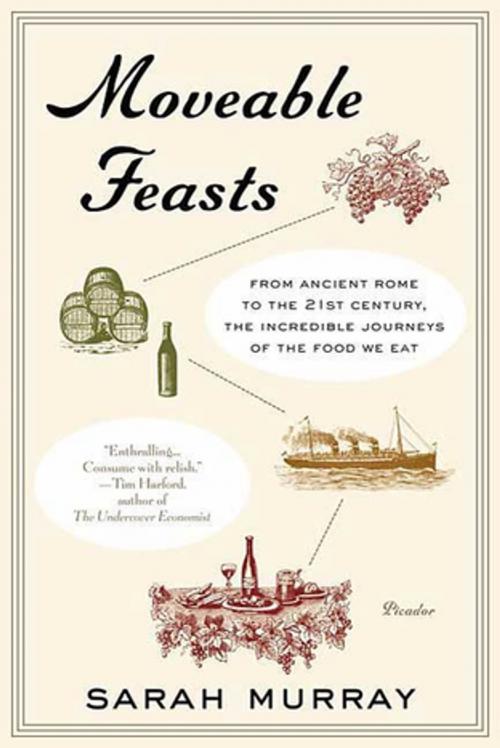Moveable Feasts
From Ancient Rome to the 21st Century, the Incredible Journeys of the Food We Eat
Business & Finance, Industries & Professions, Industries, Nonfiction, Social & Cultural Studies, Social Science| Author: | Sarah Murray | ISBN: | 9781429970273 |
| Publisher: | St. Martin's Press | Publication: | November 13, 2007 |
| Imprint: | St. Martin's Press | Language: | English |
| Author: | Sarah Murray |
| ISBN: | 9781429970273 |
| Publisher: | St. Martin's Press |
| Publication: | November 13, 2007 |
| Imprint: | St. Martin's Press |
| Language: | English |
Today the average meal has traveled thousands of miles before reaching the dinner table. How on earth did this happen? In fact, long-distance food is nothing new and, since the earliest times, the things we eat and drink have crossed countries and continents. Through delightful anecdotes and astonishing facts, Moveable Feasts tells their stories.
For the ancient Romans, the amphora---a torpedo-shaped pot that fitted snugly into the ship's hold---was the answer to moving millions of tons of olive oil from Spain to Italy. Napoleon offered a reward to anyone who could devise a way of preserving and transporting food for soldiers. (What he got was the tin can.) Today temperature-controlled shipping containers allow companies to send their frozen salmon to China, where it's thawed, filleted, refrozen, and sent back to the United States for sale in supermarkets as "fresh" Atlantic salmon.
Combining history, science, and politics, Financial Times writer Sarah Murray provides a fascinating glimpse into the extraordinary odysseys of food from farm to fork. She encounters everything from American grain falling from United Nations planes in Sudan to Mumbai's tiffin men who, using only bicycles, carts, and their feet, deliver more than 170,000 lunches a day.
Following the items on a grocery store shopping list, Murray shows how the journeys of food have brought about seismic shifts in economics, politics, and even art. By flying food into Berlin during the 1948 airlift, the Allies kept a city of more than two million alive for more than a year and secured their first Cold War victory, appealing to German hearts and minds---and stomachs. In nineteenth-century Buffalo, the grain elevator (a giant mechanical scooping machine) not only turned the city into one of America's wealthiest, but it also had a profound influence on modern architecture, giving Bauhaus designers an important source of inspiration.
In a thought-provoking and highly entertaining account, Moveable Feasts brings an entirely fresh perspective to the subject of food. And today, as global warming makes headlines and concerns mount about the "food miles" clocked by our dinners, Murray poses a contentious question: Is buying local always the most sustainable, ethical choice?
Today the average meal has traveled thousands of miles before reaching the dinner table. How on earth did this happen? In fact, long-distance food is nothing new and, since the earliest times, the things we eat and drink have crossed countries and continents. Through delightful anecdotes and astonishing facts, Moveable Feasts tells their stories.
For the ancient Romans, the amphora---a torpedo-shaped pot that fitted snugly into the ship's hold---was the answer to moving millions of tons of olive oil from Spain to Italy. Napoleon offered a reward to anyone who could devise a way of preserving and transporting food for soldiers. (What he got was the tin can.) Today temperature-controlled shipping containers allow companies to send their frozen salmon to China, where it's thawed, filleted, refrozen, and sent back to the United States for sale in supermarkets as "fresh" Atlantic salmon.
Combining history, science, and politics, Financial Times writer Sarah Murray provides a fascinating glimpse into the extraordinary odysseys of food from farm to fork. She encounters everything from American grain falling from United Nations planes in Sudan to Mumbai's tiffin men who, using only bicycles, carts, and their feet, deliver more than 170,000 lunches a day.
Following the items on a grocery store shopping list, Murray shows how the journeys of food have brought about seismic shifts in economics, politics, and even art. By flying food into Berlin during the 1948 airlift, the Allies kept a city of more than two million alive for more than a year and secured their first Cold War victory, appealing to German hearts and minds---and stomachs. In nineteenth-century Buffalo, the grain elevator (a giant mechanical scooping machine) not only turned the city into one of America's wealthiest, but it also had a profound influence on modern architecture, giving Bauhaus designers an important source of inspiration.
In a thought-provoking and highly entertaining account, Moveable Feasts brings an entirely fresh perspective to the subject of food. And today, as global warming makes headlines and concerns mount about the "food miles" clocked by our dinners, Murray poses a contentious question: Is buying local always the most sustainable, ethical choice?















